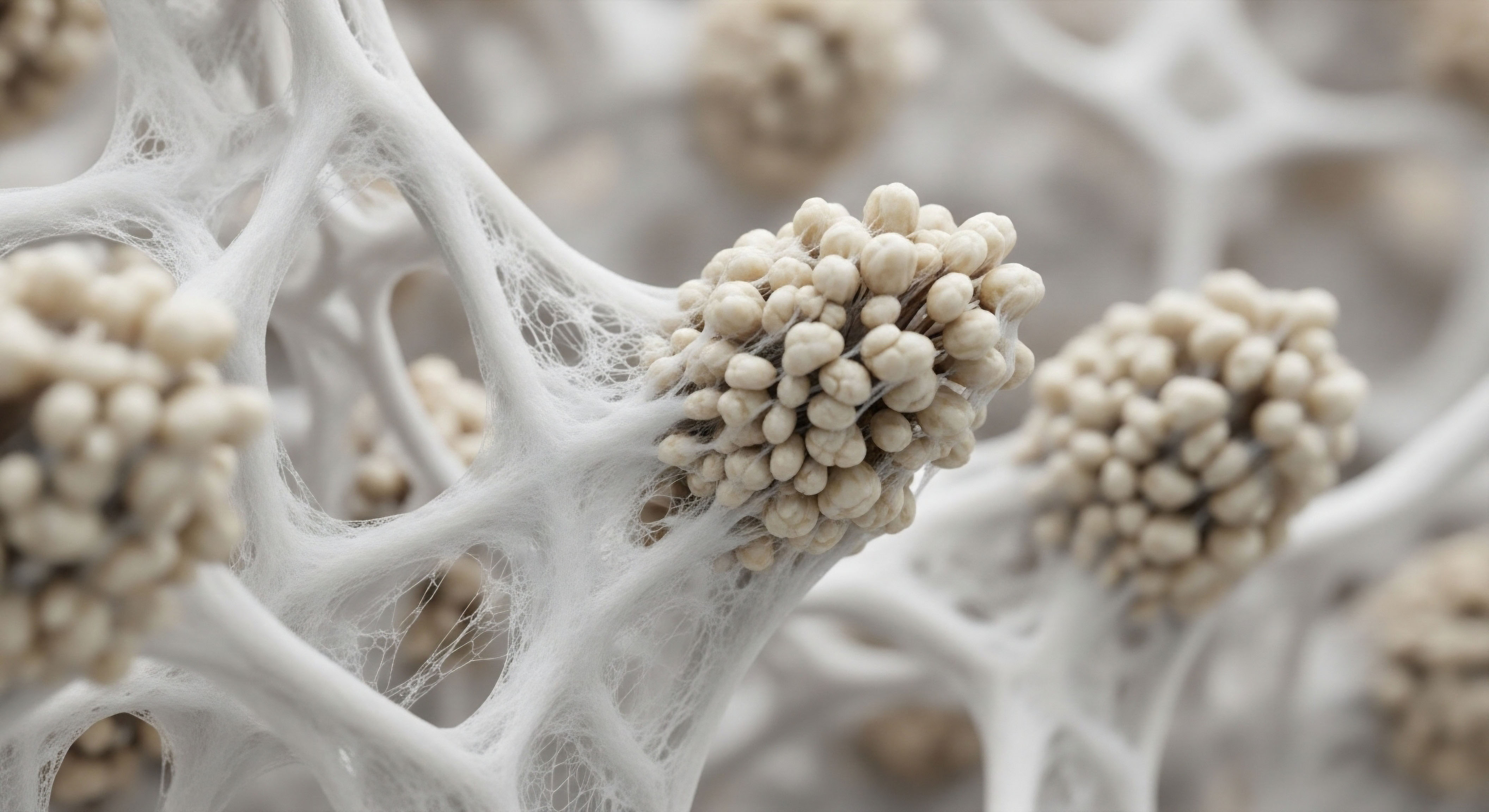

Fundamentals
The experience of navigating menopausal shifts often arrives with a constellation of symptoms, among them, the profound and sometimes disorienting changes in mood. Many individuals describe a sense of emotional volatility, a feeling of being unmoored from their usual emotional equilibrium.
This is not a personal failing or a sign of weakness; it is a direct physiological consequence of significant hormonal recalibrations occurring within the body. Understanding these biological underpinnings is the initial step toward reclaiming a sense of stability and vitality.
At the core of these shifts lies the intricate dance of the endocrine system, particularly the declining production of ovarian hormones such as estrogen and progesterone. These biochemical messengers do far more than regulate reproductive cycles; they exert widespread influence across various physiological systems, including the central nervous system.
Estrogen, for instance, plays a significant role in modulating neurotransmitter activity, affecting levels of serotonin, dopamine, and norepinephrine, all of which are critical for mood regulation, cognitive function, and emotional resilience. A reduction in estrogen can therefore directly impact these delicate neurochemical balances, leading to symptoms such as irritability, anxiety, sadness, and even a diminished capacity for joy.
Progesterone, often recognized for its calming properties, also experiences a decline during the menopausal transition. This hormone interacts with gamma-aminobutyric acid (GABA) receptors in the brain, promoting a sense of tranquility and reducing neuronal excitability. As progesterone levels fluctuate and diminish, the natural anxiolytic effect it provides lessens, potentially contributing to heightened feelings of tension and restlessness. The interplay between these two primary ovarian hormones creates a complex hormonal milieu that directly influences emotional well-being.
Recognizing these internal biological shifts validates the lived experience of those undergoing menopause. The emotional turbulence is a tangible manifestation of physiological changes, not an imagined state. This understanding forms the bedrock upon which effective strategies, both lifestyle-based and clinically guided, can be built to restore balance and alleviate discomfort. The goal is to address the root causes of these mood alterations, providing a pathway to greater emotional stability and overall well-being.
Menopausal mood shifts are a direct physiological consequence of declining ovarian hormones, impacting neurochemical balances essential for emotional equilibrium.
Initial considerations for supporting hormonal health often begin with foundational lifestyle adjustments. These interventions, while seemingly simple, lay the groundwork for optimizing the body’s inherent capacity for balance. Dietary choices, regular physical activity, effective stress mitigation techniques, and consistent, restorative sleep patterns all contribute significantly to overall metabolic and endocrine function. These elements do not operate in isolation; they are deeply interconnected, forming a web of influence that can either support or disrupt hormonal harmony.

Understanding Hormonal Communication
The body’s hormonal system operates much like a sophisticated internal messaging service, with hormones acting as signals that instruct cells and organs on how to function. When these signals become inconsistent or diminish, as they do during menopause, the receiving systems can become dysregulated. This dysregulation can manifest in various ways, including the emotional shifts experienced.
- Estrogen’s Influence ∞ This hormone supports serotonin production and receptor sensitivity, contributing to feelings of well-being.
- Progesterone’s Calming Effect ∞ By interacting with GABA receptors, progesterone helps to reduce anxiety and promote relaxation.
- Neurotransmitter Modulation ∞ Hormonal fluctuations directly impact the balance of brain chemicals responsible for mood, sleep, and cognitive function.
Addressing these foundational biological realities with a blend of informed lifestyle choices and, when appropriate, targeted clinical protocols, offers a comprehensive strategy for managing menopausal mood swings. The journey toward reclaiming vitality begins with acknowledging the biological basis of these experiences and then applying evidence-based approaches to support the body’s natural processes.


Intermediate
Moving beyond the foundational understanding of hormonal shifts, the synergy between lifestyle interventions and clinical protocols becomes evident in addressing menopausal mood swings. Clinical approaches aim to recalibrate the endocrine system directly, while lifestyle modifications create an optimal internal environment for these biochemical adjustments to take hold and sustain their benefits. This integrated strategy offers a more robust and enduring pathway to emotional stability.
One primary clinical protocol involves hormonal optimization protocols, specifically tailored for women experiencing peri-menopausal and post-menopausal symptoms. These protocols often include the judicious application of Testosterone Cypionate, typically administered via weekly subcutaneous injection at low doses (e.g. 10 ∞ 20 units or 0.1 ∞ 0.2ml).
While testosterone is often associated with male physiology, it plays a vital role in female well-being, influencing libido, energy levels, muscle mass, and importantly, mood and cognitive clarity. Its decline in menopause can contribute to feelings of apathy, low motivation, and irritability. Restoring optimal testosterone levels can significantly improve these aspects of emotional health.
Another essential component of female hormonal balance is progesterone. Prescribed based on an individual’s menopausal status, progesterone therapy can counteract the effects of estrogen dominance (even relative dominance in the context of declining hormones) and provide its inherent calming effects. This hormone helps to stabilize mood, improve sleep quality, and reduce anxiety, directly addressing some of the most distressing emotional symptoms of menopause. The precise dosage and delivery method are individualized, often involving oral or transdermal preparations.
Clinical hormonal optimization, including testosterone and progesterone, works with lifestyle adjustments to stabilize mood during menopause.
For some individuals, pellet therapy offers a long-acting option for testosterone delivery. These small pellets, inserted subcutaneously, release a consistent dose of testosterone over several months, providing sustained hormonal support without the need for frequent injections.
When appropriate, an Anastrozole prescription may accompany hormonal optimization protocols, particularly if there is a tendency for testosterone to convert excessively into estrogen, which could lead to undesirable effects. Anastrozole acts as an aromatase inhibitor, helping to maintain a favorable balance of sex hormones.

How Lifestyle Enhances Clinical Outcomes
Lifestyle interventions serve as powerful co-therapies, amplifying the benefits of clinical protocols. Consider the impact of nutrition ∞ a diet rich in whole, unprocessed foods, healthy fats, and adequate protein provides the necessary building blocks for hormone synthesis and neurotransmitter production. Conversely, a diet high in refined sugars and inflammatory ingredients can exacerbate systemic inflammation and contribute to blood sugar dysregulation, both of which negatively impact mood and hormonal balance.
Regular physical activity, particularly a combination of aerobic exercise and strength training, supports metabolic health, improves insulin sensitivity, and promotes the release of endorphins, natural mood elevators. Exercise also aids in stress reduction and improves sleep architecture, both indirectly supporting emotional equilibrium.
Stress mitigation techniques, such as mindfulness practices, deep breathing exercises, or spending time in nature, directly influence the hypothalamic-pituitary-adrenal (HPA) axis, the body’s central stress response system. Chronic stress can deplete neurotransmitters and disrupt hormonal feedback loops, intensifying mood swings. By consciously reducing stress, individuals can create a more resilient internal environment.
Sleep quality is another non-negotiable aspect. During sleep, the body repairs, regenerates, and balances its hormonal systems. Insufficient or fragmented sleep can disrupt circadian rhythms, elevate cortisol levels, and impair neurotransmitter function, all of which contribute to emotional instability. Prioritizing consistent, restorative sleep is therefore a cornerstone of both lifestyle and clinical success.

Synergistic Strategies for Emotional Well-Being
The table below illustrates how specific lifestyle interventions complement clinical hormonal support in managing menopausal mood shifts.
| Lifestyle Intervention | Mechanism of Action | Synergy with Clinical Protocols |
|---|---|---|
| Nutrient-Dense Diet | Provides precursors for hormone and neurotransmitter synthesis; reduces inflammation. | Optimizes cellular reception of administered hormones; supports metabolic pathways for hormone metabolism. |
| Regular Physical Activity | Improves insulin sensitivity; releases endorphins; reduces stress hormones. | Enhances hormonal signaling efficiency; supports healthy body composition for better hormone balance. |
| Stress Mitigation | Modulates HPA axis activity; preserves neurotransmitter reserves. | Reduces physiological burden that can counteract hormonal therapy; improves emotional resilience. |
| Restorative Sleep | Regulates circadian rhythms; optimizes hormone production and clearance. | Allows the body to fully utilize and respond to hormonal support; prevents sleep-deprivation induced mood dysregulation. |
The integration of these approaches creates a powerful therapeutic alliance. Clinical protocols provide targeted biochemical recalibration, while lifestyle interventions build a robust physiological foundation, allowing the body to sustain and maximize the benefits of hormonal support. This comprehensive perspective acknowledges the interconnectedness of all bodily systems in achieving optimal emotional health during menopause.

Can Dietary Choices Influence Hormonal Stability?
Indeed, dietary choices exert a profound influence on hormonal stability and, by extension, emotional well-being during menopause. The quality of nutrients consumed directly impacts the body’s ability to synthesize, metabolize, and utilize hormones effectively. For example, adequate intake of healthy fats, such as those found in avocados, nuts, seeds, and fatty fish, provides cholesterol, a precursor for all steroid hormones, including estrogen, progesterone, and testosterone. Without sufficient dietary fat, the raw materials for hormonal production may be limited.
Moreover, the gut microbiome plays a significant role in hormone metabolism, particularly the “estrobolome,” a collection of gut bacteria that metabolize and regulate circulating estrogen levels. A diverse and healthy gut microbiome, supported by a diet rich in fiber from fruits, vegetables, and whole grains, can promote balanced estrogen excretion and reabsorption, preventing fluctuations that might contribute to mood instability.
Conversely, a diet high in processed foods and low in fiber can disrupt gut health, potentially leading to less predictable hormone levels.
Blood sugar regulation is another critical dietary consideration. Frequent spikes and crashes in blood glucose, often caused by diets high in refined carbohydrates and sugars, trigger the release of cortisol, a stress hormone. Chronic cortisol elevation can interfere with sex hormone production and receptor sensitivity, exacerbating mood swings and feelings of anxiety. A balanced approach to nutrition, emphasizing stable blood sugar, provides a more consistent internal environment for hormonal equilibrium.


Academic
A deeper exploration into the alleviation of menopausal mood swings necessitates a systems-biology perspective, analyzing the intricate interplay of biological axes, metabolic pathways, and neurotransmitter function. The menopausal transition represents a significant neuroendocrine event, extending beyond simple ovarian decline to impact the entire Hypothalamic-Pituitary-Gonadal (HPG) axis and its downstream effects on brain chemistry. Understanding these complex mechanisms provides a scientific rationale for the synergistic application of lifestyle and clinical interventions.
The HPG axis, a central regulatory system, orchestrates the production of sex hormones. During menopause, the ovaries become less responsive to pituitary signals (Follicle-Stimulating Hormone and Luteinizing Hormone), leading to a dramatic reduction in estrogen and progesterone synthesis.
This ovarian insufficiency triggers a compensatory increase in pituitary gonadotropins, creating a state of hormonal flux that directly impacts the central nervous system. Estrogen receptors are widely distributed throughout the brain, particularly in regions associated with mood regulation, such as the amygdala, hippocampus, and prefrontal cortex. The withdrawal of estrogen affects neuronal excitability, synaptic plasticity, and neurogenesis, contributing to the observed emotional volatility.
Beyond direct hormonal action, the menopausal transition influences neurotransmitter systems. Estrogen modulates the synthesis, release, and reuptake of key neurotransmitters, including serotonin, dopamine, and gamma-aminobutyric acid (GABA). Serotonin, often associated with feelings of well-being, can see reduced availability or receptor sensitivity with declining estrogen, contributing to depressive symptoms.
Dopamine, vital for motivation and reward, may also be affected, leading to apathy or anhedonia. GABA, the primary inhibitory neurotransmitter, is influenced by progesterone metabolites, which act as positive allosteric modulators of GABA-A receptors. The reduction in progesterone therefore diminishes this natural anxiolytic effect, increasing susceptibility to anxiety and irritability.
Menopause impacts the HPG axis and neurotransmitter systems, influencing mood through complex neuroendocrine changes.
Metabolic health and inflammation represent additional critical factors in the pathophysiology of menopausal mood swings. The decline in estrogen is associated with shifts in fat distribution, insulin sensitivity, and systemic inflammation. Adipose tissue, particularly visceral fat, is metabolically active and can produce pro-inflammatory cytokines.
Chronic low-grade inflammation can cross the blood-brain barrier, affecting neuroinflammation and neurotransmitter balance, thereby exacerbating mood disturbances. Clinical research indicates a correlation between markers of inflammation and the severity of menopausal symptoms, including mood changes.

Targeted Biochemical Recalibration
Clinical protocols, such as Testosterone Replacement Therapy (TRT) for women, directly address these biochemical imbalances. Low-dose Testosterone Cypionate, administered subcutaneously, can restore physiological levels of this androgen, which is a neurosteroid influencing brain function. Testosterone receptors are present in various brain regions, and its optimization can improve mood, cognitive function, and overall sense of well-being. A study published in the Journal of Clinical Endocrinology & Metabolism demonstrated that testosterone therapy in postmenopausal women improved mood and reduced depressive symptoms.
The inclusion of progesterone, often micronized progesterone, is vital not only for endometrial protection in women with an intact uterus but also for its direct neuroactive properties. Its metabolites, such as allopregnanolone, interact with GABA-A receptors, promoting anxiolysis and improving sleep architecture. This dual action provides both systemic hormonal balance and direct neurological support for mood stability.
Beyond traditional hormonal agents, certain growth hormone peptides may indirectly support mood and overall vitality by improving sleep quality and body composition, which are often disrupted during menopause. For instance, peptides like Ipamorelin / CJC-1295 stimulate the pulsatile release of growth hormone, leading to improved sleep, enhanced recovery, and better metabolic function.
While not direct mood modulators, the downstream effects of improved sleep and metabolic health can significantly alleviate factors contributing to mood instability. A meta-analysis in Sleep Medicine Reviews highlighted the association between sleep disturbances and mood disorders in menopausal women.

Interconnectedness of Biological Systems
The table below outlines the interconnectedness of various biological systems and how their dysregulation contributes to menopausal mood swings, along with the synergistic impact of interventions.
| Biological System/Pathway | Menopausal Impact | Contribution to Mood Swings | Synergistic Intervention |
|---|---|---|---|
| HPG Axis | Ovarian senescence, fluctuating estrogen/progesterone. | Direct neurosteroid withdrawal effects on brain regions. | Hormonal Optimization Protocols (Testosterone, Progesterone). |
| Neurotransmitter Systems | Altered serotonin, dopamine, GABA synthesis/receptor sensitivity. | Depression, anxiety, irritability, anhedonia. | Hormonal Optimization, Stress Mitigation, Nutrient-Dense Diet. |
| Metabolic Health | Insulin resistance, altered lipid metabolism, increased visceral fat. | Systemic inflammation, energy dysregulation, impact on brain function. | Balanced Nutrition, Regular Exercise, Growth Hormone Peptides. |
| Inflammatory Pathways | Increased pro-inflammatory cytokines due to estrogen decline. | Neuroinflammation, exacerbation of mood symptoms. | Anti-inflammatory Diet, Stress Reduction, Adequate Sleep. |
The complexity of menopausal mood swings demands a sophisticated, multi-pronged approach. Clinical protocols provide targeted biochemical support, directly addressing hormonal deficiencies and their immediate neurological consequences. Simultaneously, lifestyle interventions create a resilient physiological environment, optimizing metabolic function, reducing inflammation, and supporting the overall neuroendocrine system. This comprehensive strategy acknowledges that true well-being arises from the harmonious function of all interconnected biological systems, offering a pathway to profound and lasting emotional stability.

How Do Peptides Influence Hormonal Balance and Mood?
Peptides, as signaling molecules, can influence hormonal balance and mood through various indirect and direct mechanisms. While not primary hormonal replacement agents, certain peptides can optimize physiological processes that, in turn, support endocrine function and neurological health. For example, Sermorelin and Ipamorelin / CJC-1295 are growth hormone-releasing peptides.
By stimulating the body’s natural production of growth hormone, they can improve sleep quality, enhance body composition, and support cellular repair. Improved sleep alone has a significant positive impact on mood regulation, reducing irritability and anxiety often associated with sleep deprivation during menopause.
Other peptides, such as PT-141 (Bremelanotide), are specifically designed to address sexual health. While its primary action is on melanocortin receptors to improve sexual desire, a healthy and fulfilling sexual life can significantly contribute to overall emotional well-being and relationship satisfaction, indirectly alleviating mood disturbances. The impact of sexual health on mood is often underestimated, yet it plays a vital role in a woman’s sense of vitality and connection.
Furthermore, peptides like Pentadeca Arginate (PDA), which focuses on tissue repair, healing, and inflammation modulation, can contribute to systemic health. By reducing chronic inflammation, PDA might indirectly support brain health and neurotransmitter balance, as inflammation is increasingly recognized as a contributor to mood disorders. The body’s systems are interconnected; supporting one area often yields benefits across others, creating a cascade of positive effects that contribute to emotional stability.

References
- Davis, S. R. et al. “Testosterone for Postmenopausal Women with Low Libido ∞ A Systematic Review and Meta-analysis of Randomized Controlled Trials.” Journal of Clinical Endocrinology & Metabolism, vol. 99, no. 10, 2014, pp. 3524-3532.
- Polo-Kantola, P. et al. “Sleep Disturbances and Mood Disorders in Menopausal Women ∞ A Meta-analysis.” Sleep Medicine Reviews, vol. 29, 2016, pp. 1-10.
- Genazzani, A. R. et al. “Neuroendocrine and Clinical Effects of Estrogen and Progesterone in Perimenopausal Women.” Gynecological Endocrinology, vol. 20, no. 1, 2005, pp. 1-10.
- Brinton, R. D. “The Healthy Brain in Midlife and Beyond ∞ A Review of the Role of Estrogen.” Clinical Therapeutics, vol. 37, no. 9, 2015, pp. 1893-1901.
- Gordon, J. L. et al. “Ovarian Hormone Fluctuation, Neurotransmitters, and Mood in Women.” Journal of Clinical Psychiatry, vol. 76, no. 2, 2015, pp. 163-173.
- Prior, J. C. “Perimenopause ∞ The Complex Endocrinology of the Menopausal Transition.” Endocrine Reviews, vol. 27, no. 2, 2005, pp. 107-133.
- Maki, P. M. et al. “Cognitive Effects of Estrogen Therapy in Postmenopausal Women ∞ A Review of the Evidence.” Menopause, vol. 18, no. 10, 2011, pp. 1060-1070.
- Shifren, J. L. et al. “The North American Menopause Society Position Statement on Hormone Therapy ∞ 2017 Update.” Menopause, vol. 24, no. 7, 2017, pp. 728-754.
- Handa, R. J. et al. “Neuroendocrine Regulation of Stress and Mood by Steroid Hormones.” Frontiers in Neuroendocrinology, vol. 30, no. 2, 2009, pp. 140-153.
- Virtanen, J. K. et al. “Dietary Fatty Acids and Risk of Depression ∞ A Cohort Study.” PLoS One, vol. 8, no. 9, 2013, e75719.

Reflection
The journey through menopausal changes, particularly the emotional shifts, is deeply personal. The insights shared here are not merely clinical data points; they are guideposts for understanding your own unique biological landscape. Recognizing the intricate dance of hormones, neurotransmitters, and metabolic pathways within your body is the first step toward reclaiming a sense of control and well-being. This knowledge empowers you to move beyond simply enduring symptoms to actively shaping your health trajectory.
Consider this exploration a starting point, an invitation to engage more deeply with your own physiology. The path to vitality is rarely a single, linear one; it often involves a thoughtful combination of informed lifestyle choices and, when indicated, precise clinical support. Your body possesses an incredible capacity for balance, and with the right understanding and personalized guidance, you can recalibrate your systems to function optimally, allowing you to experience life with renewed emotional stability and vigor.



